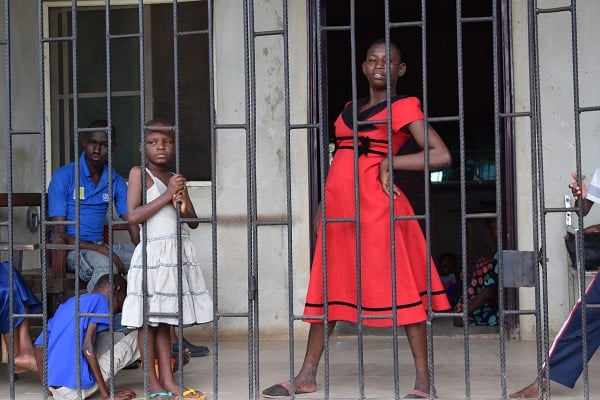BY HUSSEIN ADOTO
In Nigeria, children with special needs often live on the margins of our healthcare, our schools, and even our compassion. I have met many of them during my time as a medical student.
I once met a child diagnosed with Klinefelter syndrome. The condition affects only males. The boy I met was tall, malnourished, and hyperactive. His sister was his primary caregiver. She looked overwhelmed.
She hinted that the boy had been abandoned to her and asked for recommendations for a school for children with special needs. The only public school for such children that I know of is in Ilorin. I wonder how she sorted herself out. That was during COVID-19.
Advertisement
That same year, I met a nurse whose husband had asked her to allow their child to die. The boy’s history suggested he hadn’t cried at birth. His young brain didn’t receive air for several minutes. The consequence was a brain injury that drained their income and nearly broke their family. The mother decided to keep fighting. When she saw us, she was spending about ₦30,000 monthly on physiotherapy alone.
I’ve met more children with special needs since then. During my time in paediatrics, I met a boy whose case was particularly pitiable. He had Down syndrome. He was left in the care of an aged, illiterate, and obviously poor grandmother.
I met him on a Thursday morning, all curled up in his grandma’s lap. His scalp looked like it had been bathed in boiling water. I thought of Stevens-Johnson Syndrome, a severe skin reaction to some drugs.
Advertisement
“That is Staphylococcal Scalded Skin Syndrome (SSSS),” said my consultant when I mentioned my diagnosis. SSSS is a skin condition caused by toxins produced by Staph. aureus. These toxins penetrate the skin layers, causing the skin to peel like a scald or burn. That was my first time learning about it.
Returning to the child, my consultant was concerned about the quality of care the boy was receiving. Children with special needs suffer neglect and abuse. They are also often abandoned with grandparents, many of whom don’t have a choice but to accept. The boy’s grandma didn’t hide her frustration with this arrangement.
“I have not rested from raising his mother, now she’s burdened me with this.” Her words left the consultant searching for a treatment option that would be convenient for her. When the option came, she accepted it grudgingly. I don’t have it in me to blame her.
I have seen enough of such patients to empathise with their caregivers, even if I don’t wear their shoes. I’ve been a caregiver to a loved one. I’ve been scared. I’ve been frustrated. I’ve hoped. But I’ve not faced something as chronic as caring for a child with special needs. Or as lonely and hurtful. Still, I’ve had a front-row view.
Advertisement
I have seen a mother struggle again and again to keep her son’s head steady as it dangled. I saw her wipe his face as he drooled. I wasn’t sure what went through her mind as the doctor discussed therapy options for her son that day. Still, I could tell it was deep, solemn. Her breath came out slowly and measured. Sometimes she’d let the saliva build before going through the motions again. From ‘bundle of joy’ to that? God!
Such children have few opportunities in life. One study surveyed 304 Nigerian children with cerebral palsy. Of the 117 who were of school age, only 9 attended a school for children with special needs; 37 attended a regular school.
“The major reasons for keeping the children away from school,” the authors wrote, “were financial constraints, severe functional impairment, lack of access to assistive mobility devices, fear of stigma and the assumption that the children were not capable of learning.”
Many of them cannot pay for rehabilitative care either. Some parents hustle to start, only to tap out a few weeks into the programme. Parents try to do their best at home.
Advertisement
They teach their children to sit, move, and relate. They train themselves to recognise their cues and cope with their tantrums (for lack of a better word). They try to keep them clean and active (to prevent sores), but that itself brings its own challenges. They have to be a parent, teacher, cook, playmate, and more.
Other people’s children avoid theirs. Regular schools are not particularly accommodating or capable of meeting their needs. Special schools are few and expensive. On top of that, they have a life to live and other children to care for. The end, more often than not, is abandonment—the neglect we’ve become used to.
Advertisement
Still, some carry on. Somehow. The parents find ways to adjust, to endure, to hope, to show up every day, even when there seems to be no end in sight. They have learned to create their own happiness, to fight for joy in small moments, and to celebrate the tiny victories that others may never notice.
I saw those wins in a video recently. A teenage boy with special needs was asked to score by kicking the ball from one end of the pitch. Crowds gathered. Voices roared in cheers and taunts. Cameras set. Action.
Advertisement
Clad in oversized polo and three-quarter jean trousers, the boy looked around, steadied himself, and waved his path clear. He paused and turned left to shake one of the few voices cheering him.
As the voices grew, he cupped his head in his palms. His instructor chipped in some last-minute instructions. Nod, nod. I got it
Advertisement
The camera switched to the pitch before him. Eyes lined the pitch everywhere from the touchline to behind the goalpost. Everyone was ready for the boy’s shot. He seemed ready, too, as we see him tapping his wrist to ask for time as the camera turned on him. Set.
He arched his back, looked up, down, up, and down again, then kicked the ball. The kick wasn’t Ronaldo-esque, but the ball moved on. It moved on and on… and into the net. It’s a goal! The crowd erupted into celebrations.
When I look back at the children with special needs that I have met, I realise very few of them stood a chance of growing up to that level of functionality. They get worse over time and die young. So his age and the things he could do were, for me, a win.
But the greater victory was in the community support: how everyone joined in to watch and cheer, even if a number were there for comic relief. I saw the challenge, the kick, the triumph, the elation—and I celebrate.
Children with special needs have been overlooked for so long in Nigeria that a win—whatever they consider a win—is not just a milestone, but a rare moment in the sun.
And when that sun breaks through—however briefly—it shines on the promise of a better future. It reminds me that maybe, just maybe, children with special needs could go on to lead better lives in Nigeria, supported by government and society.
It’s a tall dream, yes. But what else do I have?
Hussein Adoto writes from Ilorin via [email protected].
Views expressed by contributors are strictly personal and not of TheCable.











